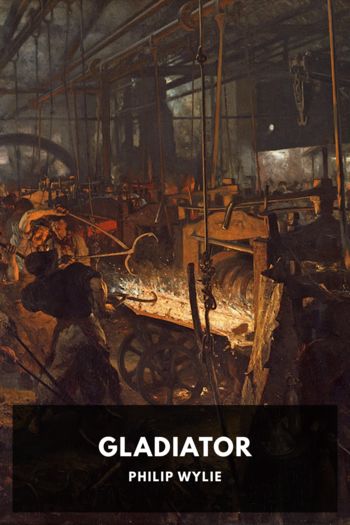Gladiator - Philip Wylie (readnow .TXT) 📗

- Author: Philip Wylie
Book online «Gladiator - Philip Wylie (readnow .TXT) 📗». Author Philip Wylie
He was without money now, as he had been then, so long ago. He budged on the bench and challenged himself to think.
What would you do if you were the strongest man in the world, the strongest thing in the world, mightier than the machine? He made himself guess answers for that rhetorical query. “I would—I would have won the war. But I did not. I would run the universe single-handed. Literally single-handed. I would scorn the universe and turn it to my own ends. I would be a criminal. I would rip open banks and gut them. I would kill and destroy. I would be a secret, invisible blight. I would set out to stamp crime off the earth; I would be a super-detective, following and summarily punishing every criminal until no one dared to commit a felony. What would I do? What will I do?”
Then he realized that he was hungry. He had not eaten enough in the last few days. Enough for him. With some intention of finding work he had left Mr. Shayne’s house. A call on the telephone from Mr. Shayne himself volunteering a position had crystallized that intention. In three days he had discovered the vast abundance of young men, the embarrassment of young men, who were walking along the streets looking for work. He who had always worked with his arms and shoulders had determined to try to earn his living with his head. But the white-collar ranks were teeming, overflowing, supersaturated. He went down in the scale of clerkships and inexperienced clerkships. There was no work.
Thence he had gone to the park, and presently he rose. He had seen the clusters of men on Sixth Avenue standing outside the employment agencies. He could go there. Any employment was better than hunger—and he had learned that hunger could come swiftly and formidably to him. Business was slack, hands were being laid off; where an apprentice was required, three trained men waited avidly for work. It was appalling and Hugo saw it as appalling. He was not frightened, but, as he walked, he knew that it was a mistake to sit in the park with the myriad other men. Walking made him feel better. It was action, it bred the thought that any work was better than none. Work would not hinder his dreams, meantime.
When he reached Forty-second Street he could see the sullen, watchful groups of men. He joined one of them. A loose-jointed, dark-faced person came down a flight of stairs, wrote on a blackboard in chalk, and went up again. Several of the group detached themselves and followed him—to compete for a chance to wash windows.
A man at his side spoke to him. “Tough, ain’t it, buddy?”
“Yeah, it’s tough,” Hugo said.
“I got three bones left. Wanna join me in a feed an’ get a job afterward?”
Hugo looked into his eyes. They were troubled and desirous of companionship. “No, thanks,” he replied.
They waited for the man to scribble again in chalk.
“They was goin’ to fix up everybody slick after the war. Oh, hell, yes.”
“You in it?” Hugo asked.
“Up to my Goddamned neck, buddy.”
“Me, too. Guess I’ll go up the line.”
“I’ll go witcha.”
“Well—”
They waited a moment longer, for the man with the chalk had reappeared. Hugo’s comrade grunted. “Wash windows an’ work in the steel mills. Break your neck or burn your ear off. Wha’ do they care?” Hugo had taken a step toward the door, but the youth with the troubled eyes caught his sleeve. “Don’t go up for that, son. They burn you in them steel mills. I seen guys afterward. Two years an’ you’re all done. This is tough, but that’s tougher. Sweet Jesus, I’ll say it is.”
Hugo loosened himself. “Gotta eat, buddy. I don’t happen to have even three bones available at the moment.”
The man looked after him. “Gosh,” he murmured. “Even guys like that.”
He was in a dingy room standing before a grilled window. A voice from behind it asked his name, age, address, war record. Hugo was handed a piece of paper to sign and then a second piece that bore the scrawled words: “Amalgamated Crucible Steel Corp., Harrison, NJ.”
Hugo’s emotional life was reawakened when he walked into the mills. His last nickel was gone. He had left the train at the wrong station and walked more than a mile. He was hungry and cold. He came, as if naked, to the monster and he did it homage.
Its predominant color scheme was black and red. It had a loud, pagan voice. It breathed fire. It melted steel and rock and drank human sweat, with human blood for an occasional stimulant. On every side of him were enormous buildings and woven between them a plaid of girders, cables, and tracks across which masses of machinery moved. Inside, Thor was hammering. Inside, a crane sped overhead like a tarantula, trailing its viscera to the floor, dangling a gigantic iron rib. A white speck in its wounded abdomen was a human face.
The bright metal gushed from another hole. It was livid and partially alive; it was hot and had a smell; it swept away the thought of the dark descending night. It made a pool in a great ladle; it made a cupful dipped from a river in hell. A furnace exhaled sulphurously, darting a snake’s tongue into the sky. The mills





Comments (0)